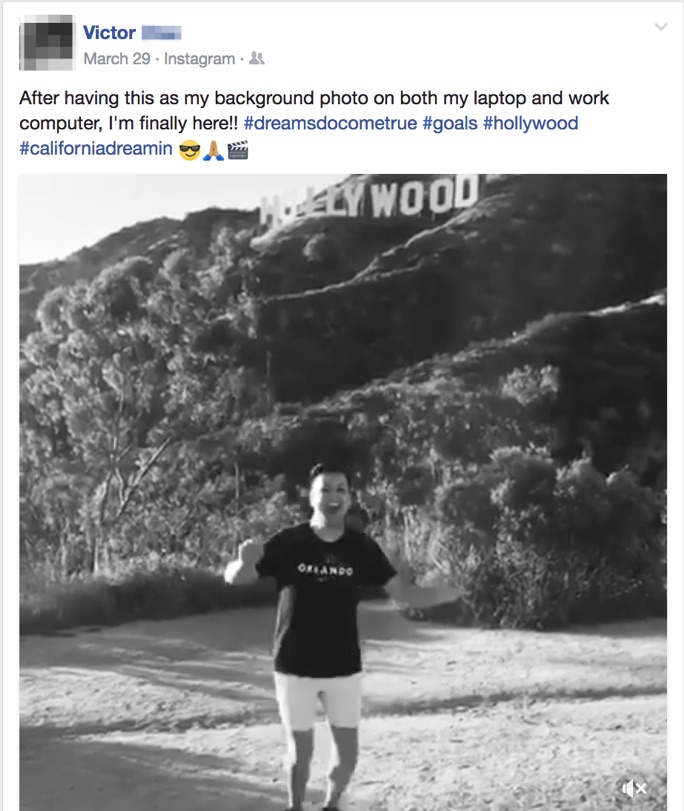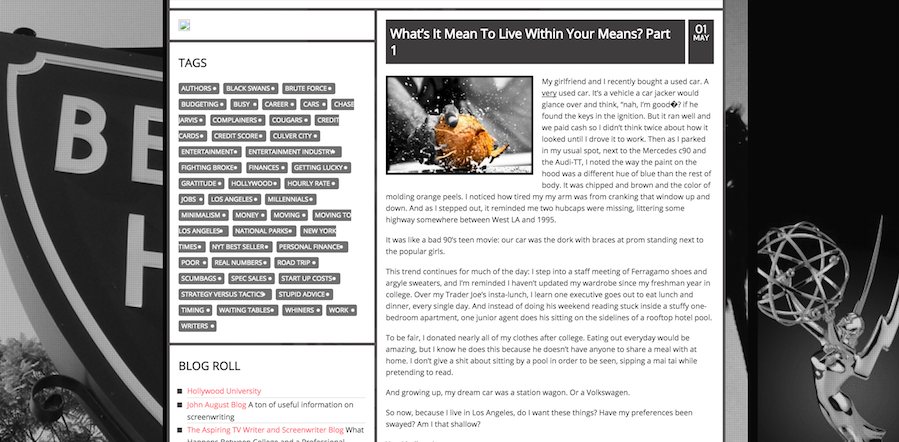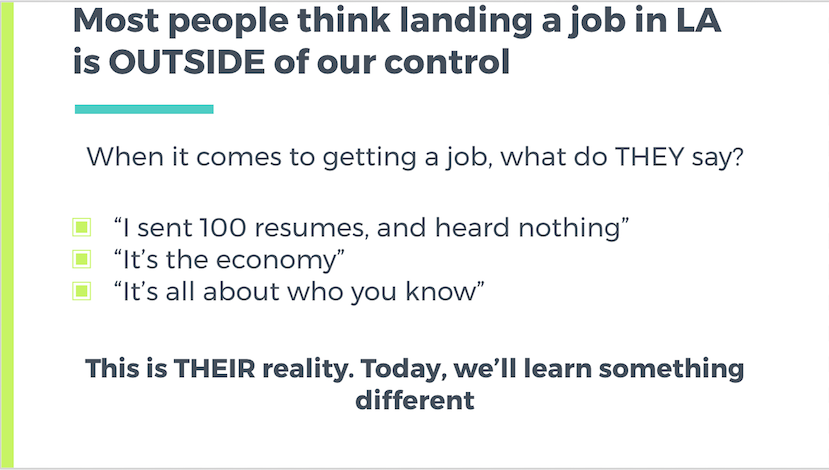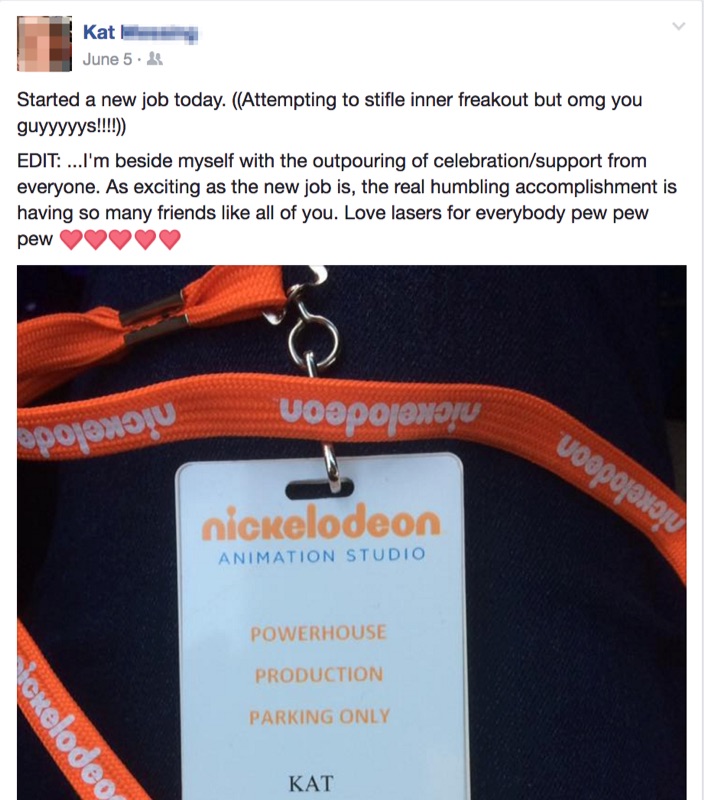I worked on my first online business — a site called FightingBroke.com — for 4 years. In its first iteration, it was a personal finance site for young people working in Hollywood.
It got less traction than the Baywatch reboot.
A year into it, I pivoted and started documenting my journey as a Hollywood assistant, and how others could climb the television ladder. This version started bringing in an audience of people who also wanted to break into entertainment.
Finally, in its most successful but (ultimately) doomed iteration, FightingBroke taught people how to move to Los Angeles and land their first job.
I knew all the benefits of having an online business. All the reasons to start an online business. So I pushed that boulder up the mountain for a year.
My site was the best resource on the web for moving to LA, but it never made the impact I wanted. After another year, I decided to partner with someone who ran a similar site, so we could divide and conquer: He focused on the day-to-day operations and technical back-end. I focused on executing on the online business strategy that I learned during my tenure at I Will Teach.
We spent the next 6 months making major adjustments to the business. We:
- Reworked our email strategy and created a year’s’ worth of content
- Created a new automated email drip sequence
- Surveyed 70 brand new members of our list and dug into their exact hopes and fears
- Redesigned the site
After all that work, we were stunned when we looked at the numbers:
We hadn’t moved the needle. Nothing had changed.
It was frustrating. I was embarrassed. I had received a top level education from one of the OGs in the internet marketing world, who taught hundreds of people how to start their first online business with no money… yet I couldn’t increase traffic or conversions on my own website after 6 months?
I spent another month taking a deep dive into the quant, trying to decide whether I should double-down on this again… or to let it go. Long story short, I decided there was no upside to pouring more money and time into this online business. I wasn’t even living in Los Angeles OR working in Hollywood anymore. My heart wasn’t in it.
I handed everything over to my partner, and wished him the best.
Looking back on the history of my first online business, the signs that this wasn’t a viable business were there from the start: There was never product market fit. People who wanted help moving to LA didn’t want to pay. And I never wanted to publish in volume to make money with advertising.
But it’s like being stuck in a shitty relationship that everyone knows won’t work… except for you. I toiled for 4 years hoping it was worth the slog because:
“It’s a good learning experience.”
“So many people email me about what a huge help I am, eventually I’ll find a way to make money.”
“Giving up is for losers.”
It hurt to kill this idea. Moving to Los Angeles and starting my entertainment career from scratch was a huge part of my identity. Starting my own online business in my 20s was a part of my identity. If FightingBroke didn’t work out quite the way I wanted it to, then so be it. But there were moments I was really proud of. Here are my favorites:
The Moving to Los Angeles online course
The most successful product that came out of FightingBroke was an online course that taught people how to move to LA. Brilliantly, I called it: Move to Los Angeles.
It was my first pass at creating an online program on my own. I hosted it on my own site, created and narrated the slide decks, wrote the sales page and everything in between.
It was never going to win any design awards, but a ton of work went into making sure the 10 students got an incredible experience. They got content every few days to work on to keep them accountable, a great Facebook community where they could ask questions, and one-on-one calls with me to discuss their progress.
The best part, after the program many of them made the move:


In total, my online business netted about $500 on this program that took me 40 hours to build. So basically, nothing. It was a labor of love, but the content stood on its own. People changed their lives and this program helped them do it.
Documenting my Hollywood journey
I can’t remember what I had for dinner for yesterday, and have to think twice before telling people my age.
But I remember summer nights in 2010 spent at Delmonico’s bar in Albany drinking half-off martinis and planning the move to Los Angeles. I remember the shine of the street lamps as I stumbled out of a restaurant on Washington Boulevard, after finding out I landed my first job in LA. And I remember schlepping back and forth on the 10 to pick up free (or near-free) furniture after scouring Craigslist for deals all night.
In all of its various iterations, FightingBroke was a place to document each step of the journey, from my first “networking” drinks (with Ben Petuchowski), the fiasco of my directorial debut (a short called “Generation Text”) and the advice I got from amazing, accomplished writers like Erin Levy. I remember every job I had on this journey.
The climb became my obsession. I substituted scripts for food, the laptop for my health, and put all my other relationships on hold in order to drink with as many Hollywood assistants as possible, most of whom I’d never see again. It was a grind and lonely and frustrating, and part of me loved every minute of it.
FightingBroke never succeeded as an online business, but the process of creating it is that string that holds these memories in a gentle web. It documents one of the most tumultuous periods of my life, and hopefully will guide other Hollywood hopefuls long after the memories fade.
I learned to solve the Money Problem first
No one read the blog for the first few months. That version — personal finance advice for young Hollywood — was doomed from the start, mostly because it was as inspiring as watching concrete set.
When people move out to Hollywood, they want Vinny Chase, not Dave Ramsey. They want the SoHo House membership for $10,000, not advice on how to scrimp and save $20 when meeting another assistant for drinks.
But while it never succeeded as an online business, it became the foundation of my relationship to career, money, and happiness. I learned it was important to solve the Money Problem first, because there was one thing that didn’t make any sense: How could executives, writers, and producers ink million dollar deals… and still live paycheck-to-paycheck?
I literally watched someone open up a $50,000 executive producer check, and complain about getting screwed in the deal.
Perhaps they did get screwed. Perhaps that should have been a $5,000,000 check. My point is: How can you be so unhappy about a single paycheck that is someone else’s annual salary?
The longer I worked in Hollywood, the more I was able to piece together “the how”: The $2 million dollar rental home in the Palisades. The leased Mercedes e20. The daughter you have to convince NOT to trade up her brand new Volkswagen for a Mercedes (because she can’t be seen in a VW).
All of this led to compromise. Like making shitty deals for people, telling them their herbology story set in the West Indies could totally be a New York Times bestseller (and TV show!) so you can hook them up with your ghostwriter and double-dip on a 10% commission on 2 deals.
These are our role models? These incredibly intelligent, successful, but unhappy people were the ones we were supposed to emulate? I remember one colleague, who constantly complained about his crappy creative executive salary. One day, he came into the office, bragging about his Equinox membership.
“I thought you had no money. Why sign-up for Equinox?”
“Dude. Gotta spend money to make money.”
Jesus.
Combine all of this with the math of what success looks like: A talented baby writer (new to television writing) can spend 10 years breaking into the industry. Then she’ll sell a pilot for $75,000, but only net $40,000. Watching this play out changed my perspective on money… and it changed my approach to my career and happiness.
The order of operations matter. I decided if I wanted it all — a career, happiness, and money — I have to approach it in the right order. That means solving the Money Problem first. If you solve the Money Problem, it’s a lot easier to do right by your family and make the right decisions for your career, without compromise. And without this failed version of my online business, I don’t know if I would have come to the same conclusion.
I remember Dennis once received a 5-figure check from HBO for work on Boardwalk Empire. He told us to send it back.
Why would anyone RETURN money to the network?
That money was for writing a script. But he felt he was so heavily rewritten, it had someone else’s fingerprints all over it. So he couldn’t accept the money.
His manager asked if he was sure.
“Yeah,” he said. “At least I’ll be able to sleep at night.”
What I’d do differently
Looking back on the history of my first online business, are there things I would have done differently with FightingBroke? Absolutely.
I could have spent a lot less time “thinking” and “strategizing”… and a lot more time “doing.” There are about 100 ideas banked in a spreadsheet somewhere, that will never see the light of day, because I was too busy “playing business.”
I could have validated my ideas faster. And carved out longer chunks of time to create and ship, rather than sit on ideas for weeks or even months. Now I’m trying to roll those lessons into my next projects.
The content is still valuable, and I believe there’s still a home somewhere for the course. But it’s all deprioritized now.
It’s important to point out: Creating an online business is a great thing to try. I believe everyone should give it a shot. Even if your business ultimately fails, you’re going to reap so many benefits in the process. You’ll write better, create better, and learn to think from the customer’s perspective. There’s not a second of this whole journey that’s been “wasted.”
It all gets paid forward. You shape the lives of all your readers and (hopefully) customers.
And they, in turn, shape yours.
###
Photo Credit: Stefano Corso




1 Comment
Pingback: I Moved to Dublin, Ireland | Christopher Ming Blog